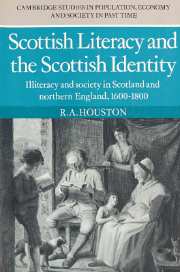 Scottish Literacy and the Scottish Identity
Scottish Literacy and the Scottish Identity Book contents
- Frontmatter
- Contents
- Tables
- Abbreviations
- Preface
- 1 The ideal of Scottish literacy
- 2 Structures and trends in illiteracy in the seventeenth and eighteenth centuries
- 3 Illiteracy in mid seventeenth-century Britain
- 4 The reasons for literacy
- 5 Measures of literacy
- 6 Oral culture and literate culture
- 7 The politics of literacy
- 8 Literacy and the Scottish identity
- Appendices
- Bibligraphy
- Index
8 - Literacy and the Scottish identity
Published online by Cambridge University Press: 11 November 2009
- Frontmatter
- Contents
- Tables
- Abbreviations
- Preface
- 1 The ideal of Scottish literacy
- 2 Structures and trends in illiteracy in the seventeenth and eighteenth centuries
- 3 Illiteracy in mid seventeenth-century Britain
- 4 The reasons for literacy
- 5 Measures of literacy
- 6 Oral culture and literate culture
- 7 The politics of literacy
- 8 Literacy and the Scottish identity
- Appendices
- Bibligraphy
- Index
Summary
We saw at the start of this study how Scotland's achievements in education and literacy have been elevated to the status of a legend. Scotland's state educational system, which began in the seventeenth century, is said to have produced an unusually literate population at a period when other countries were still struggling with ineffective voluntary systems. For some nineteenth–century educational reform lobbies and for many twentieth–century historians, this truly was 'a matter of history which cannot be denied'. The myth that Scotland enjoyed an unusually high level and wide social spread of literacy at an early date has been used to justify both educational change and the lack of it in Scotland and elsewhere since the eighteenth century. It forms part of the self–image of the Scots and of their image among other peoples.
In 1970 Tom Nairn went so far as to complain that 'Scotland is the land where ideal has never, even for an instant, coincided with fact'. Notions about literacy and education in Scotland provide only some support for such a view.The picture is in actuality rather less black and white than this. The ideal of Scottish education and literacy is not always wholly divorced from reality, but some aspects of it do constitute an exaggeration and an over–simplification of the truth. Using both quantitative material and more traditional qualitative evidence, we have seen that the levels of literacy in seventeenth– and eighteenth–century Lowland Scotland were not greatly dissimilar from those in northern England.
- Type
- Chapter
- Information
- Scottish Literacy and the Scottish IdentityIlliteracy and Society in Scotland and Northern England, 1600–1800, pp. 256 - 266Publisher: Cambridge University PressPrint publication year: 1985
